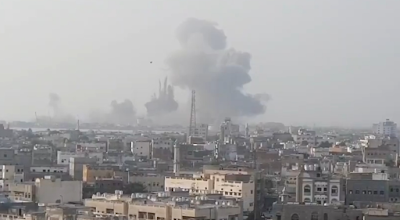Tel Aviv/Sanaa – May 17, 2025 — The Israeli Air Force (IAF) launched a major air operation on Friday, striking two Houthi-controlled ports in western Yemen in response to a series of missile and drone attacks by the Iran-backed militant group. The military warned that further aggression would result in the targeted elimination of Houthi leadership, including its top commander, Abdul-Malik al-Houthi.
The strikes, which followed the conclusion of U.S. President Donald Trump’s regional visit, mark Israel’s most extensive operation in Yemen since hostilities reignited earlier this year.
According to the Israel Defense Forces (IDF), 15 fighter jets dropped approximately 35 precision-guided munitions on infrastructure at the Hodeidah and Salif ports. The strikes were supported by Israeli refueling aircraft and surveillance planes. The ports, located along Yemen’s Red Sea coast, have been previously identified by Israeli intelligence as key nodes for the importation of Iranian weapons destined for the Houthi arsenal.
“These ports are used for the transfer of weapons and represent yet another example of the cynical exploitation of civilian infrastructure by the Houthi terror regime,” the IDF said in a statement.
The airstrikes follow a renewed barrage of attacks from Houthi forces, who have launched at least seven ballistic missiles and two drones at Israel since the IDF’s last strike on Yemen on May 6. The most recent attack occurred on Thursday night.
Escalating Regional Tensions
Friday’s operation was preceded earlier in the week by evacuation warnings issued by the IDF for Hodeidah, Salif, and a third port, Ras Isa—though the latter was not targeted in this wave of airstrikes.
The military stated that the objective was to “deepen the damage to the Houthis’ terror capabilities” and render the ports inoperable for receiving larger vessels. Estimates suggest it could take the Houthis up to a month to restore basic operations, during which time ships longer than 80 meters will be unable to dock.
“In light of the Houthi terror regime’s continued use of these ports for terror purposes, the IDF reiterates its call for civilians to avoid the area,” the statement read.
Israeli Leadership Oversees Operations
Israeli Prime Minister Benjamin Netanyahu, Defense Minister Israel Katz, and IDF Chief of Staff Lt. Gen. Eyal Zamir were present in the IAF’s underground command center during the operation.
In a strongly worded statement, Defense Minister Katz issued a warning to the Houthi leadership: “The IDF has now struck and severely damaged Houthi-controlled ports in Yemen. The Sanaa International Airport remains inoperable. If the Houthis continue their attacks on Israel, we will respond with even greater force.”
Katz directly threatened Houthi leader Abdul-Malik al-Houthi, comparing him to high-profile figures from Hamas and Hezbollah previously targeted by Israel. “As we eliminated Deif and the Sinwars in Gaza, struck Nasrallah in Beirut, and Haniyeh in Tehran, we will pursue and eliminate al-Houthi as well. We will defend ourselves—independently, decisively, and without hesitation.”
Background: Renewed Attacks Despite Ceasefire with U.S.
Despite a ceasefire agreement brokered earlier this month between the Houthis and the United States aimed at halting attacks on American assets, the militant group has continued to target Israel. The Houthis began their campaign against Israel in November 2023, shortly after the October 7 Hamas massacre, aligning their rhetoric and actions with anti-Israel and anti-Western ideologies.
During a lull in hostilities following a January 2025 ceasefire between Israel and Hamas, the Houthis paused attacks. However, since the IDF resumed operations in Gaza in March, Houthi forces have launched at least 34 ballistic missiles and 10 drones toward Israel, some of which fell short or were intercepted. One missile strike in July 2024 killed an Israeli civilian in Tel Aviv and injured several others, prompting Israel's first direct military action in Yemen.
Civilian Impact and Continued Threats
The renewed Houthi offensives have placed significant pressure on Israeli civilians, with air raid sirens sounding regularly across central and southern regions. These alerts have forced hundreds of thousands into bomb shelters at all hours, contributing to growing public anxiety and calls for stronger military responses.
As Israel intensifies its campaign to dismantle the Houthi threat, the broader regional implications remain uncertain. Analysts warn that continued escalation could further destabilize Red Sea shipping lanes and complicate ongoing diplomatic efforts to de-escalate regional tensions.




.png)
The opinions posted here do not belong to 🔰www.indiansdaily.com. The author is solely responsible for the opinions.
As per the IT policy of the Central Government, insults against an individual, community, religion or country, defamatory and inflammatory remarks, obscene and vulgar language are punishable offenses. Legal action will be taken for such expressions of opinion.